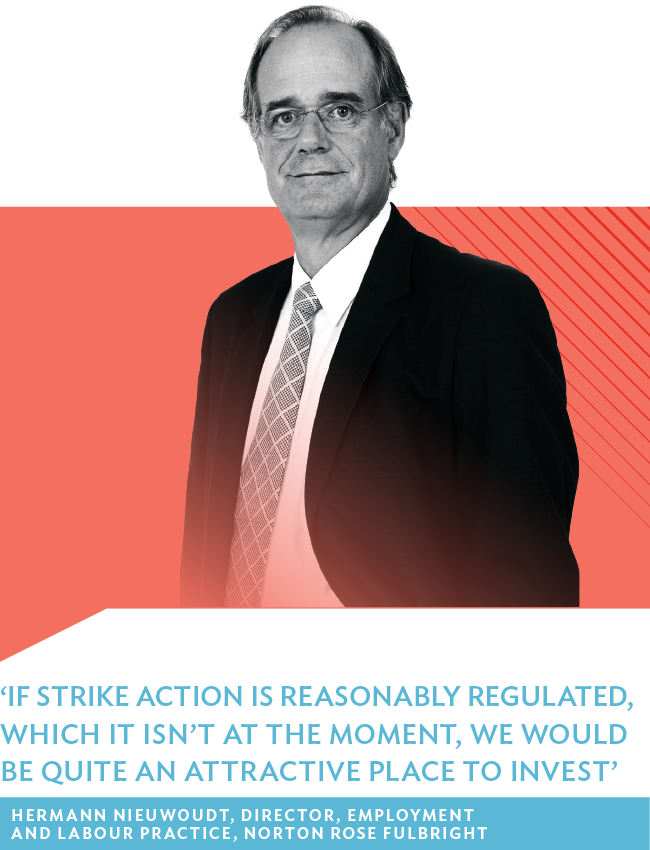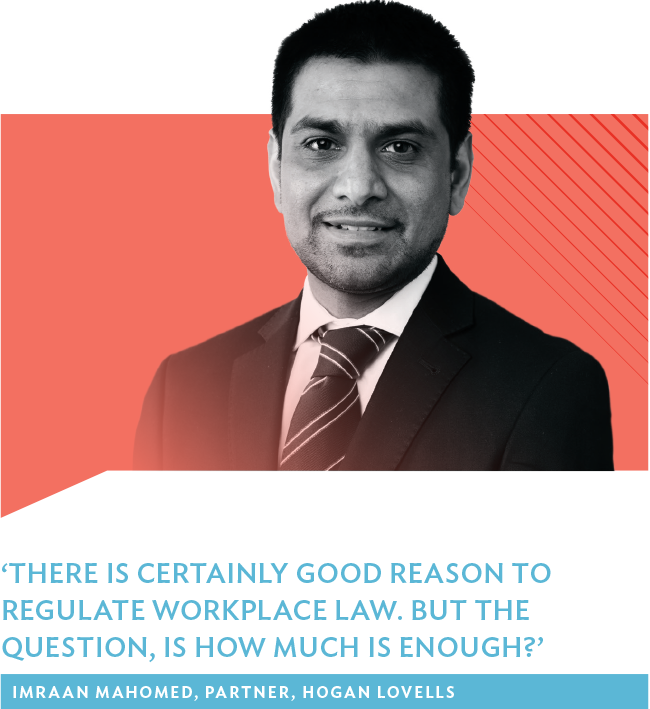Every country needs labour laws, according to Hermann Nieuwoudt, director in the employment and labour practice at Norton Rose Fulbright. ‘I don’t think that in any democracy it can be argued that labour laws are not required or that workers do not need the protection of such laws,’ he says. ‘If you consider whether ours go further than what they should or perhaps that they are not as efficient as they should be, that’s been the subject of debate since the non-racial Labour Relations Act came into effect back in the early 1980s. My view is that, in essence, the laws serve the purpose that they’re supposed to serve.’
On the other hand, Imraan Mahomed, partner and employment law practice area leader at Hogan Lovells, Johannesburg, believes workplace law in SA is over-regulated. ‘It makes the ability to do business, and specifically to set up a business, difficult,’ he says. ‘There is certainly good reason to regulate workplace law. But the question, is how much is enough? And I believe we’ve got too much.’ Companies coming into SA see the myriad pieces of legislation impacting employment and feel daunted, Mahomed says. ‘In my experience, with companies looking to set up a business in South Africa, there are two initial legal questions: one pertains to tax laws, the other to labour laws.’
Indeed, SA does have several pieces of legislation pertaining to labour, including the Labour Relations Act, the Basic Conditions of Employment Act, the Employment Equity Act, the Skills Development Act, and the Occupational Health and Safety Act, as well as different regulations that apply to different sectors. Still to come is legislation dealing with the minimum wage.
‘If you look at South Africa’s basic conditions of employment, these are absolutely necessary and I don’t believe that the minimum requirements set out in this act unduly impinge on the ability of people to do business,’ says Nieuwoudt. ‘The Employment Equity Act is another piece of necessary legislation. It is perhaps legislation that could’ve been more clearly drafted but it’s something South Africa needs and which we will have to have for years to come.’
Dian Grobler, regional manager West Rand at LabourNet, argues that, despite the many laws in place, many of the employers who cross his firm’s path are not following them. ‘I’m not even talking here about following the more stringent laws, just some of the basic human rights and laws are ignored,’ he says. ‘I see a lot of exploitation of labourers. People who are not nearly paid a living wage.’ Grobler adds that it ‘shows some immaturity in business, that the country is not yet ready to move into a less-stringent labour law environment’.
Asked whether he thinks SA’s laws are too rigid or too relaxed, Hennie van Graan, owner of WHM Labour Law Advisors, says it depends on what perspective you take. ‘From the employee side, there will always be the argument that they could be more rigid. From the employer side, they are too rigid – they inhibit entrepreneurship and kill SMEs.’
Van Graan believes SA’s labour laws are detrimental to economic growth. ‘We’ve got excellent laws,’ he says. ‘But I think it’s practically impossible for the people in the working environment to apply these.’ He cites the implementation of the workplace skills plan and the need for equity reports. You need expert knowledge to apply these, he says, which is especially difficult for smaller businesses.
Grobler says that SA’s laws ‘are how they are because of the country’s history and what happened pre-1994. We have quite stringent labour laws.If you look at this from an international perspective, we have some of the most stringent or progressive labour laws in the world’.
Van Graan agrees. ‘As far as written laws go, we are probably world champions.’ This is because we’ve got a law for everything, he adds. ‘But that’s my concern – we’ve got laws on the books that cannot be managed. It’s impossible for a small business-man. In principle, I don’t disagree with the laws, I just don’t think that South Africa has the capacity in its business expertise in the smaller businesses.’ Mahomed has strong feelings around the rigidity of SA’s labour laws. ‘In my view, business is a soft target for government. I say this because, if you take health and safety legislation as an example, and we look at the mining industry, the consequence of a mine worker dying is that a mine could be brought to a standstill. I’m not suggesting that we don’t have this form of legislation – it is important and if one miner dies on the job, that’s one miner too many. But think about a taxi that [has an accident] with 20 people [aboard]. The taxi association/employer will not be brought to a standstill. Why not regulate that industry a lot tougher? To my mind, business is a soft target and there is lack of political will.’
From the perspective of employees, SA labour law is very progressive, says Mahomed. ‘We are one of the only countries in the world that recognises the right to strike as a fundamental right. In the Constitution, there are a number of rights, and among these is the right to strike and the right to fair labour practices. That’s an indication of how progressive South African labour laws are.’
In Nieuwoudt’s opinion, the recent amendments to the Labour Relations Act have ‘tilted the balance unnecessarily towards the protection of employees’. He says: ‘I am particularly concerned about the ease with which industrial action occurs, and even more concerned about the fact that strikes get violent and that there doesn’t seem to be any effective manner in which the violence can be combated or curtailed.’
Grobler shares this sentiment. ‘You don’t see the level of industrial action anywhere else in the world like you see in South Africa. We need to move forward at some point. In terms of the strike laws, are those still relevant today, and is this helping or hurting employees or businesses?’ Grobler says that strike action is proving particularly detrimental as far as outside investment is concerned. ‘There is a lack of understanding of both the international and the monetary contexts,’ he says. ‘There needs to be more done in terms of looking at the unionised environment to help parties to understand how everything fits together; how the investors affect the business; how international investors affect Africa; and how this affects industry.’
‘The biggest concern investors have is the fact that if you get to industrial action, everything gets destroyed,’ Nieuwoudt says. This has a ratchet effect in the sense that employers take decisions that they ordinarily would not have taken just to avoid industrial action, he adds. ‘In the current economic circumstances, a 6% wage increase might be appropriate for most employers. However, a lot of the wage agreements will probably go up to 8% or 9%, because the cost of a strike is so significant. If strike action is reasonably regulated, which it isn’t at the moment, I think that we would be quite an attractive place to invest.’
For Mahomed, the concerns over investment run even deeper than this. ‘If you look at our economy currently, we’ve got to be competitive and we’ve got to attract investment, that must be the starting point,’ he says. There must also be no uncertainty, he adds, which is not so much a labour–law issue. ‘At this point in time, it’s a question of getting the economy running before we do anything else. There will be no jobs to protect if there’s no business.’ He shares some of his own experiences to demonstrate. ‘If you take business processing operations, such as call centres, what I’ve found over recent years is that business processing operators are finding the South African environment difficult and too uncertain. They’re finding it more beneficial to operate out of Kenya or Nigeria. So, because we have the uncertainties that we do in South Africa, we are losing these opportunities. Africa has become a big area of competition for us. We need to realise this quickly.’










